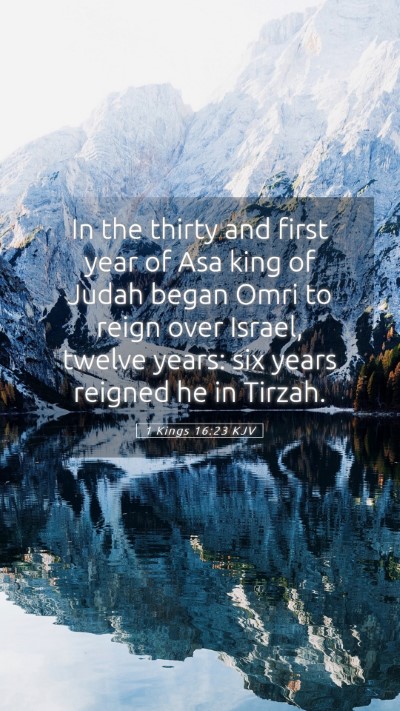Bible Verse Commentary on 1 Kings 16:23
Verse: "In the twenty and third year of Asa king of Judah began Omri to reign over Israel; twelve years reigned he in Tirzah."
Overview
This passage marks the beginning of Omri’s reign as king of Israel, occurring during the reign of Asa in Judah. Omri's ascent to the throne is a significant moment in biblical history, as his actions would shape the future of Israel. The context provided by public domain commentaries such as those by Matthew Henry, Albert Barnes, and Adam Clarke reveals the political and spiritual implications of this reign.
Historical Context
The narrative unfolds within the larger context of the divided monarchy, where Israel and Judah were separate kingdoms. Following the upheaval brought about by the reigns of various kings, Omri emerged amid instability. His reign not only sets the stage for future kings but also establishes political alliances that would impact Israel's trajectory.
Commentary Insights
-
Matthew Henry: Henry emphasizes the significance of Omri’s reign in Israel's history. He highlights that Omri’s rule was marked by both military successes and spiritual failures, noting that he led Israel into idolatry. Omri is often regarded as a king who sought strength and stability for Israel but at the cost of faithfulness to God.
-
Albert Barnes: Barnes provides a detailed commentary on the implications of Omri’s reign, noting that his establishment of a new capital, Samaria, initiated a period of prosperity and influence yet simultaneously brought about moral decline. Barnes points out that Omri's political maneuvers had long-lasting effects on the nation, setting a pattern for future kings.
-
Adam Clarke: Clarke delves into the numerical significance of the years recorded and offers insights into the forty-one years of instability before Omri's reign. He discusses the reasons behind the tumultuous nature of leadership during this timeframe, linking it to divine judgment and the people's unfaithfulness, which influenced their choice of leaders.
Spiritual Significance
The reign of Omri is representative of the broader theme of leadership within Scripture. As kings often reflect the spiritual state of their nation, Omri's rule illustrates the consequences of turning away from God's commandments. The legacy of his reign shows how political power must align with spiritual integrity to ensure the well-being of both the nation and its people.
Application of the Verse
For modern readers, 1 Kings 16:23 challenges us to consider the importance of righteous leadership in our communities and nations. It invites us to reflect on how the leaders we support embody the values that align with our faith. Moreover, it encourages individuals to engage in discussions about the role of faith in governance and societal structures.
Cross References
- 1 Kings 14:19-20: Discusses the details concerning the kings of Israel, providing context for Omri’s reign.
- Micah 6:16: References the ways of Omri and the significance of his actions in the spiritual decay of Israel.
- 2 Kings 8:26: Offers a continuation of the historical narrative following Omri’s reign, linking it to subsequent leaders.
Conclusion
In summary, 1 Kings 16:23 is a pivotal verse that invites us to explore the themes of leadership, moral integrity, and spiritual consequences. By studying this verse and its context, we gain essential Bible study insights that illuminate the importance of aligning our lives and leadership with God’s will. Through understanding such Biblical exegesis, believers can apply these lessons about leadership and faithfulness today.
For those involved in online Bible study or Bible study groups, exploring passages such as this can facilitate deep discussions about the intersection of faith and governance, aiding groups in their Bible study lessons and Bible study resources.


